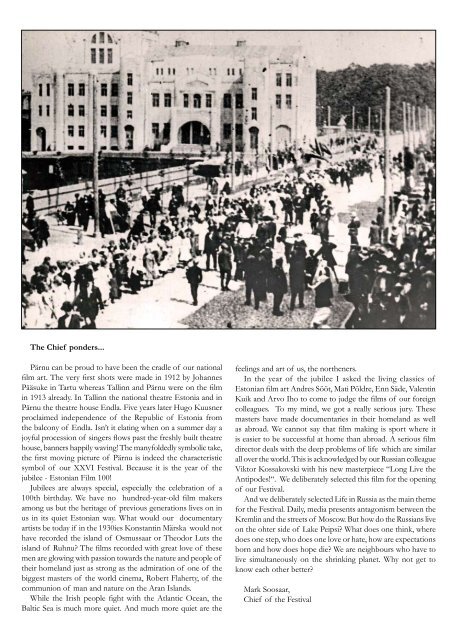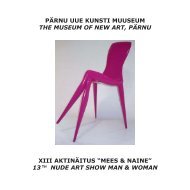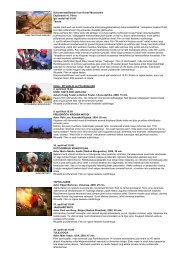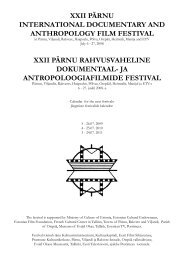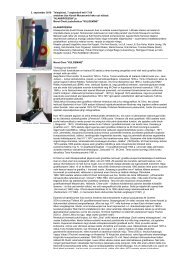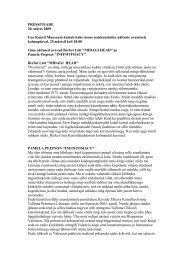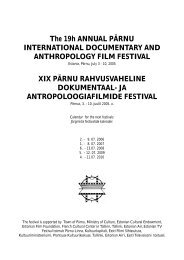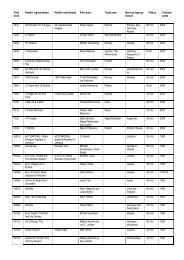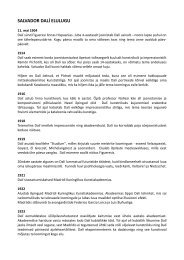xxvi pärnu international documentary and anthropology film festival ...
xxvi pärnu international documentary and anthropology film festival ...
xxvi pärnu international documentary and anthropology film festival ...
You also want an ePaper? Increase the reach of your titles
YUMPU automatically turns print PDFs into web optimized ePapers that Google loves.
The Chief ponders...<br />
Pärnu can be proud to have been the cradle of our national<br />
<strong>film</strong> art. The very first shots were made in 1912 by Johannes<br />
Pääsuke in Tartu whereas Tallinn <strong>and</strong> Pärnu were on the <strong>film</strong><br />
in 1913 already. In Tallinn the national theatre Estonia <strong>and</strong> in<br />
Pärnu the theatre house Endla. Five years later Hugo Kuusner<br />
proclaimed independence of the Republic of Estonia from<br />
the balcony of Endla. Isn’t it elating when on a summer day a<br />
joyful procession of singers flows past the freshly built theatre<br />
house, banners happily waving! The manyfoldedly symbolic take,<br />
the first moving picture of Pärnu is indeed the characteristic<br />
symbol of our XXVI Festival. Because it is the year of the<br />
jubilee - Estonian Film 100!<br />
Jubilees are always special, especially the celebration of a<br />
100th birthday. We have no hundred-year-old <strong>film</strong> makers<br />
among us but the heritage of previous generations lives on in<br />
us in its quiet Estonian way. What would our <strong>documentary</strong><br />
artists be today if in the 1930ies Konstantin Märska would not<br />
have recorded the isl<strong>and</strong> of Osmussaar or Theodor Luts the<br />
isl<strong>and</strong> of Ruhnu? The <strong>film</strong>s recorded with great love of these<br />
men are glowing with passion towards the nature <strong>and</strong> people of<br />
their homel<strong>and</strong> just as strong as the admiration of one of the<br />
biggest masters of the world cinema, Robert Flaherty, of the<br />
communion of man <strong>and</strong> nature on the Aran Isl<strong>and</strong>s.<br />
While the Irish people fight with the Atlantic Ocean, the<br />
Baltic Sea is much more quiet. And much more quiet are the<br />
feelings <strong>and</strong> art of us, the northeners.<br />
In the year of the jubilee I asked the living classics of<br />
Estonian <strong>film</strong> art Andres Sööt, Mati Põldre, Enn Säde, Valentin<br />
Kuik <strong>and</strong> Arvo Iho to come to judge the <strong>film</strong>s of our foreign<br />
colleagues. To my mind, we got a really serious jury. These<br />
masters have made documentaries in their homel<strong>and</strong> as well<br />
as abroad. We cannot say that <strong>film</strong> making is sport where it<br />
is easier to be successful at home than abroad. A serious <strong>film</strong><br />
director deals with the deep problems of life which are similar<br />
all over the world. This is acknowledged by our Russian colleague<br />
Viktor Kossakovski with his new masterpiece “Long Live the<br />
Antipodes!“. We deliberately selected this <strong>film</strong> for the opening<br />
of our Festival.<br />
And we deliberately selected Life in Russia as the main theme<br />
for the Festival. Daily, media presents antagonism between the<br />
Kremlin <strong>and</strong> the streets of Moscow. But how do the Russians live<br />
on the ohter side of Lake Peipsi? What does one think, where<br />
does one step, who does one love or hate, how are expectations<br />
born <strong>and</strong> how does hope die? We are neighbours who have to<br />
live simultaneously on the shrinking planet. Why not get to<br />
know each other better?<br />
Mark Soosaar,<br />
Chief of the Festival


